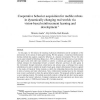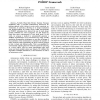163 search results - page 23 / 33 » Policy Gradient Methods for Robotics |
147
click to vote
NIPS
1992
15 years 3 months ago
1992
How can artificial neural nets generalize better from fewer examples? In order to generalize successfully, neural network learning methods typically require large training data se...
148
Voted
AI
1999
Springer
15 years 2 months ago
1999
Springer
In this paper, we first discuss the meaning of physical embodiment and the complexity of the environment in the context of multi-agent learning. We then propose a vision-based rei...
129
click to vote
ICRA
2010
IEEE
15 years 24 days ago
2010
IEEE
— Partially Observable Markov Decision Processes (POMDPs) offer a powerful mathematical framework for making optimal action choices in noisy and/or uncertain environments, in par...
159
click to vote
CORR
2011
Springer
14 years 9 months ago
2011
Springer
Recent research in multi-robot exploration and mapping has focused on sampling environmental fields, which are typically modeled using the Gaussian process (GP). Existing informa...
119
Voted
IROS
2007
IEEE
15 years 8 months ago
2007
IEEE
— Multi-agent systems (MAS) are a field of study of growing interest in a variety of domains such as robotics or distributed controls. The article focuses on decentralized reinf...


